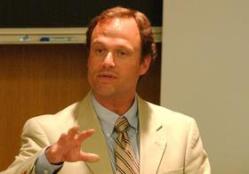
Andy Hoffman.
“If business isn’t developing solutions to our sustainability issues, they won’t be developed,” says Andy Hoffman. “If business is not part of the solution, there will be no solution.”
Hoffman is director of the Erb Institute for Global Sustainable Enterprise at the University of Michigan. “The reality is that the most powerful institution in the world is business,” he says — and he’s optimistic that business has the capability to make a huge difference in helping to solve pressing environmental problems.
Hoffman is also interested in how culture and social institutions affect our views on environmental issues. In the U.S., he says, we’ve reached a scientific consensus on climate change, but we still lack a social consensus. In order to achieve a social consensus, Hoffman believes we need to shift discussions of climate change away from the political arena and frame the issue in other ways — for example, as an issue of social equity. In order to achieve this, we need to find credible spokespeople representing diverse interests within our society.
In this interview, Hoffman and I chat about the role of business in the environmental movement, the cultural challenges posed by climate change, and “light green” organizations versus “dark greens.” Bonus for you Mad Men lovers: We also talk about a picnic scene on the show that demonstrates how culture can change our relationship to the environment.
Free MP3. (Right click, select “Save Link As.”)
This interview is part of the Generation Anthropocene project, in which Stanford students partake in an inter-generational dialogue with scholars about living in an age when humans have become a major force shaping our world.



